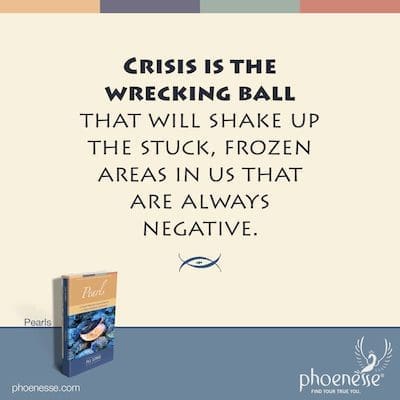Crisis is nature’s attempt to restore balance by causing a change that our ego has resisted. Our ego is that part of ourselves we have control over with our will—it thinks and it takes action. But if it obstructs change, the good and proper laws of the universe will come together and take over to effect change.

Crisis then is nothing more than a readjustment—a structural change—showing up in the form of upheaval and uncertainty, pain and difficulty, in order to achieve balance. Crisis could also just be the insecurity created when it’s time to give up a familiar way and try something new. In whatever form it shows up, chaotic or coercive, crisis is always attempting to break down old structures that are based on negativity and wrong thinking. It shakes loose ingrained habits and breaks up frozen energy patterns so new growth can happen. Indeed, the tearing down process is painful, but without it, transformation is unthinkable.
Change is an inevitable fact of life; where there’s life, there’s never-ending change. Full stop. But when we live in fear and negativity, we resist change. In doing so, we resist life itself, which stops the flow of our life force and makes suffering close in on us more tightly; our resistance may affect our overall development or just show up in a particular instance. So then crisis comes along as a means for breaking up stagnant negativity—so we can let go of it. But the more painful the crisis is, the more our ego—that will-directed part of our consciousness—attempts to block the change.
Our inherent potential is truly infinite, and the intention behind human growth is to free our potential. Because wherever negative attitudes have settled in, realizing our potential becomes impossible. We can only be healthy and free in aspects of our lives where we don’t resist change. When we’re in harmony with the universe, we’re constantly growing and feeling deeply satisfied with life. But where we have blocks, we cling to the status quo and hope nothing ever changes.
In the areas then where we don’t resist change, our lives will be relatively crisis-free. Wherever we resist change, crisis is sure to follow. Our stagnant negativity creates a structure built on faults and errors and wrong conclusions about life; we’re living in contradiction to the laws of truth and love and beauty. This structure has got to come down and crisis is the wrecking ball that will shake up the stuck, frozen areas in us that are always negative.
On any path to spiritual enlightenment, we’re going to need to do some serious work if we want to free ourselves from our own negativity. What exactly are these negativities of which we speak? They include our misconceptions and wrong conclusions about life, our destructive emotions and the behavior patterns they give rise to, our destructive defenses and our pretending to be more perfect than we are. But none of these would be that hard to overcome if it weren’t for self-perpetuating forces that compound in our psyche and keep picking up speed.
As we may know, all our thoughts and feelings are energy currents. And energy is a force that increases using its own momentum. So if our underlying beliefs and thoughts are in alignment with truth, they will be positive and the self-perpetuating momentum of their energy will increase ad infinitum. But if our concepts and feelings are based on error, they will be negative. This means the energy will compound, but it won’t go on forever.
For example, when we have a faulty concept about life, this causes us to behave in a way that inevitably seems to prove that our assumptions were right. This entrenches our destructive, defensive behavior even more firmly in our soul substance. It’s like this with our feelings too.
Our fears are always based on illusion, and we could easily overcome them if we were to challenge them and expose the fundamentally flawed premise on which they stand. Instead our fear makes us afraid of facing ourselves so we can transcend our errors. We become afraid of our fear, and then we hide our fear behind rage, or disguise it with depression. The fear compounds.
Or let’s look at depression. If we don’t courageously unearth what is causing the original feeling of depression, we’ll become depressed about being depressed. Then we’ll beat ourselves up, thinking we should be able to face our depression and not be depressed about it. But we got into this spot because we’re not really willing to face it, therefore we’re not able to, and that makes us more depressed. Next day.
Round one of a feeling—whether it’s fear or depression or another difficult emotion—is the first crisis we didn’t heed. We didn’t work to understand its true meaning and in that, we evaded it. This launches us into all the subsequent rounds of being afraid of our fear or depressed about our depression. Caught up in such self-perpetuating vicious circles, we become more and more removed from the original feeling and from ourselves, which of course makes it even harder to find the original feeling. Finally we reach a breaking point. That’s when the perpetual motion machine we’ve created has a breakdown.
Divine qualities like truth and love and beauty go on infinitely, but distortions and negativity never do. They cease abruptly when the pressure bursts. Enter, crisis. This is painful and we usually resist it with all our might. But what if things worked the other way, and negativity went on forever? Then hell could be eternal. OK, so then about that crisis.
The two places this negative self-perpetuating principle shows up most obviously is in the case of anger and frustration. We get angry at ourselves for being angry. In a similar way, frustration itself is easier to tolerate than our frustration about how frustrated we are. We get impatient with ourselves for our impatience, wishing we reacted differently but not able to do so because we haven’t faced the root cause.
In all these instances, we are not recognizing the “crises”—anger, frustration, depression or impatience—for what they are, and that makes the wheel turn tighter until the inflamed boil bursts open. Then we have a real crisis.
The eruption of a crisis more clearly defines our options: figure out the meaning or continue to escape. We are given a means for exiting the ride, or we can keep going and be flung from it more painfully later. In the end, resistance really is futile.
Mystics speak of a “dark night of the soul,” which is such a time of breaking down old structures. But we usually misunderstand this and look in the wrong direction. We need to search for inner truth, which means we must summon a tremendous amount of honesty to challenge our cherished, tightly held convictions. But cutting off the motor force that compounds our destructive cycles is a smart way to avoid pain and problems.
Just as a thunderstorm serves to clear the air when certain conditions in the atmosphere collide, crises are natural, balance-restoring events. But it is possible to grow without creating “dark nights” for ourselves. The price we need pay for this is self-honesty. We must cultivate the habit of inner looking whenever disharmony arises; we must be willing to abandon our pet attitudes and ideas.
Often, the biggest struggle in a crisis isn’t about giving up an old structure, but about our straining and opposing new ways of operating and reacting. We can gauge the urgency of the need for change and the intensity of our opposition by how intense and painful the crisis is. Oddly, the event itself is not the litmus test, but rather our response to it.
It is possible that a traumatic outward event—the loss of a loved one, a war, illness, or loss of fortune and home—creates less inner pain and agitation than something relatively minor. This happens when, in the former case, we are able to adjust, accept and find a way to deal with the event. In the latter case, we, for some reason, may have greater resistance. Then we’ll try to rationalize our disproportionate reaction, but this doesn’t lead to lasting peace.
What does lead us to peace? First, it helps to accept the process of the crisis and not obstruct it; go with it instead of fighting it; then relief can come fairly soon. Second, we need to surface the wrong idea underpinning the negative experience. Every painful life event stands on error, and a critical aspect of our work is to articulate it. This is an incontrovertible fact, and yet how often does this manage to slip our mind when we meet an unhappy situation?
So far, we’ve been focusing on the negative aspects of self-perpetuation. What about the positive side? With love, for example, the more we love, the more we can extend genuine feelings of love and our giving won’t impoverish anyone. On the contrary, we’ll increasingly find new and deeper ways to give, and more will come to us and others from it. Experiencing and expressing love builds momentum.
It’s the same with any constructive, joyous, fulfilling attitude or feeling—the more we have, the more we must generate. Steady expansion and self-expression ripples outward in a never-ending process once we tap into the innate wisdom, beauty and joy of our Higher Self. The initial effort to establish contact and actualize these powers takes some effort on the part of our ego. But once we get the ball rolling, the process is effortless. The more wonder we bring forth, the more there will be.
It bears repeating that our potential to experience creativity and pleasure, beauty and joy, and wisdom and love, is infinite. But how deeply do we know this reality? How much do we believe in our own resources to solve all our problems? How much do we trust in the possibility of all we have not yet manifested? And just how much do we believe that we can create new vistas? How much do we realize we can couple excitement with peace, and serenity with adventure, making life a string of beautiful events even if initial difficulties must still be overcome? How much do we believe in any of this, people?
Let’s connect some dots: to the extent we pay lip-service to these beliefs, we will still feel depressed, hopeless, fearful or anxious; we’ll remain tied up in the tight knots of conflict. Because we don’t yet believe in our own infinitely expanding potential. That’s because there’s something inside that we’re desperately hanging onto. And we don’t want to bring that out into the light because we don’t want to give it up or change it.
Perhaps we give in to the dangerous temptation to project our experience onto others, blaming them for our misery. Or worse we might project them onto ourselves in a self-devastating way. We avoid our issues with attitudes like ‘I’m so bad, I’m nothing,’ which is always dishonest. We need to expose this kind of dishonesty so that our crisis, whether large or small, can be meaningful.
This applies to every single person in the world. For whom among us hasn’t had to put up with more than a few “dark nights”? But if we learn to explore even the smallest shadow for its deeper meaning, no painful eruption of crises will be needed. There will be no rotten structures that need to be destroyed. In this, the stark reality of life will be revealed to us: we have the golden opportunity to live in ever-expanding joy. Then the sun will rise and our dark night will prove to be the educator—the therapist—that life can be, once we try to understand it.
How often do we find ourselves faced with negativity from someone else, but we’re not sure how to handle it? We feel anxious, uncertain and not clear about how to interact with them. We may not directly feel their hostility, but are confused by their indirectness or their evasion. Or maybe we feel guilty about how we respond to them, which makes us even less able to handle the situation.
This frequently happens when we are blind to our resistance to change. We project all our unattended-to baggage onto the other, making it impossible to be aware of what is actually going on in them. Then we don’t know how to handle things. But when we start to handle our own selves, growing in our capacity to honestly look at what disturbs us and becoming willing to change, we’ll “magically”—as if it had nothing to do with us—receive a gift: we will see others negativity in a way that frees us, while providing a way to confront them that is effective.
Our catch-22 is that we resist changing and fear growing because we sense an inevitable breakdown is steadily drawing nearer. Yet we resist doing what we can to avoid the crisis. This is the story of human life; this is where we’re caught. As such, we must keep repeating the lesson until we learn that our fear of change is an error. If we can expose this illusion, our life will open up almost at once.
Change, however, cannot be accomplished by the ego alone. The willing, conscious part of ourselves is incapable of doing it alone. A significant portion of our resistance and difficulty with changing comes from having forgotten that this is not a job for the ego. We need divine help.
Our forgetfulness sends us careening from one extreme to the next. On one hand, we think we must accomplish inner transformation by ourselves. But we know we don’t have what it takes to do this on our own, so we give up. We feel it’s hopeless to change and so we don’t really try; we don’t even clearly express our desire to do so.
From the perspective of the ego-self alone, we’re right to think we don’t have the capacity to change. We resist as a way to avoid the frustration of wanting something we don’t have the tools to create. Disappointment is realistic for the ego. That, deep down, is what our ego is contemplating. Meanwhile, we’re professing a belief in a God or higher power who is supposed to do all this for us. We’re totally passive, waiting for it.
In short, we’re not trying where we should be. We flip from false hope to false resignation, which are two sides of the coin of absolute passivity. The pushy ego that attempts to outstrip its limited capacity is going to land back in the lap of falsely waiting or falsely giving up hope—either alternately or simultaneously—wearing itself out in the process and rendering itself passive.
To make real positive change, we have to want it, and we have to be willing to be in truth. We need to pray to the divine living deep in our soul, then wait for the change to happen. We must wait with patience, confidence and trust; this is quintessential for change to occur.
Our prayer expresses this sentiment: “I want to change, but I can’t do it with my ego alone. God will do it through me. I am a willing and receptive channel for this to happen.” If we’re not willing to say such a prayer, then we’re not really willing to change. We still doubt the reality of the higher forces inside ourselves.
Don’t fret—all is not lost. We can acquire this confident, patient waiting and trust that help will come by being utterly willing to be in truth. This isn’t the childish attitude of wanting God to do it for us. Nope, this time we’re taking action and facing ourselves; we’re accepting adult self-responsibility; we’re wanting truth and change; and we’re willing to expose our hidden shame. We also know the limitations of our ego, so we can relax.
This is how we let God into our soul from deep within; we open up for it to happen. Change can become a living reality for anyone and everyone who adopts such an approach. Our lack of faith and trust that the divine can be activated from within us is only because we haven’t given ourselves the chance to experience the stark truth of this reality. And how can we possibly trust something we’ve never experienced?
If we are willing to commit ourselves, we will let go of the old shore we’re used to clinging to and float in momentary uncertainty. But this won’t bother us. We’ll feel safer than we did when we were hanging onto the shores of our illusions, the false structures that must collapse. Soon we will realize there is nothing to fear.
We must call up all the courage we can muster, only to realize this is the most secure way to live—letting go and expanding into life. We’ll see the truth: living this way is natural and takes no courage at all.
Return to Pearls Contents
Read Original Pathwork® Lecture: #183 The Spiritual Meaning of Crisis



